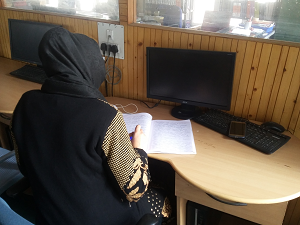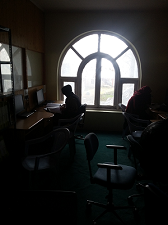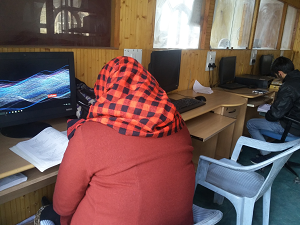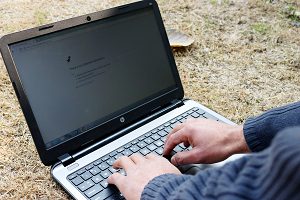Amid Unrest in the Valley, Students See a Dark Wall
Srinagar, J&K: On November 18, Srinagar lost 3G and 4G connectivity after a militant and a sub-inspector of the Jammu & Kashmir police force were killed, and one militant caught alive in a brief encounter on the outskirts of the city, near Zakoora crossing. District authorities said data connectivity was snapped to “maintain law and order”.
 |  |  |  |
|---|
Students in Srinagar’s SPS Library. Picture Courtesy: Aakash Hassan
But to Jasif Ayoub, an aspiring chartered accountant, it seemed like an obstruction to his exam preparations. Not being able to access lectures and texts online, Ayoub was perturbed. He had moved from Anantnag in south Kashmir, to Srinagar, only to have an easy access to the vast pool of information on the world wide web. “My hometown witnesses internet shutdowns very frequently. That is why I moved to live with relatives in Srinagar to prepare for my exams. But the internet speed here too is getting worse by the day,” says Ayoub.
The internet is usually the first administrative casualty when any law & order situation arises in the Kashmir Valley, which has been restive and agitated over the last two decades. Despite the frequency of shutdowns, the state still does not issue a prior warning, or offer emergency connectivity measures. Residents know the pattern now: the mobile internet and SMS are the first to go down, and then broadband and other lease-line service providers follow.
J&K tops the list of Indian states that have witnessed most number of internet shutdowns, with 27 being the count from 2012 to 2017, according to internetshutdowns.in, run by Software Freedom Law Centre. There has been a sharp rise in the curbs on internet imposed this year, with over 30 shutdowns until November 22. Government authorities who issue and implement these bans say it is the only way to undercut the strength of social media in organising movements and resistance. The prime example is Burhan Wani, the 21-year-old Hizb-ul-Mujahideen commander who had used his Facebook account to popularise and justify militant resistance. Wani’s death saw protests erupting across the Valley, which made the state snap internet services for about six months on prepaid mobile networks. For four months, there was no internet access on postpaid mobile networks too. These have been the longest intervals of ban. However, day-long, hour-long and even week-long periods of non-connectivity are alarmingly common.
The incessant disruption of internet services prevents students from accessing online education resources. Class IX student Haiba Jaan in Srinagar depends on lectures from Khan Academy, an online coaching centre, to clarify a lot of concepts. A resident of Hyderpora in Srinagar, Haiba points to the i-Pad in her hand. “This is the best way of learning," she says. "I was not satisfied with my teachers in school or tuition classes. I found studying on the internet quite useful. But, the problem with that is the regular internet shutdowns." Her parents got a postpaid broadband connection the previous year to help Haiba. "But even that gives up many times during total internet shutdowns," says Haiba.
In May this year, the government suspended the use of 22 social media and messaging platforms in Kashmir for a month. Skype was one of the messaging services banned. This put Mehraj Din through great trouble. Shortlisted for a summer programme at Istanbul, Turkey, this scholar of Islamic Studies at Kashmir University, had to appear for the final interview via Skype. "The ban could have ended all my chances to get selected had the organisers not agreed to an audio interview considering the ground situation here," says Mehraj, who is currently compiling his dissertation for the university. "I have a deadline to meet, but repeated shutdowns have affected my work," he says. "This a punishment from the State."
Full libraries, half studies
When home and mobile internet connections are snapped, the state government's e-learning initiative in public libraries provides some respite. Mehrosha Rasool wants to secure an MBBS seat through the NEET competitive exam. She visits the SPS library in Srinagar religiously to access the study material that has been downloaded and made available on computers. The 17-year-old resident of Nishat in Srinagar says libraries are useful since one never knows how long the internet services at home will stay stable. Irshad Ahmad, another student utilising the facilities at SPS library, says he moved to Srinagar from Pattan town of north Kashmir because "this facility of accessing education material is not available at the library in my tehsil."
Most prominent libraries in Srinagar have computers and tablets for students’ access, "But the rooms often become overcrowded as hundreds of students have registered at the libraries for internet facilities," says Mehrosha.
Schools in the Valley, meanwhile, rely on traditional means in the absence of the e-learning systems. Javaid Ahmad Wani, a political science teacher from south Kashmir’s Anantnag, believes that with little time in the year to even complete the basic syllabus thanks to frequent and sudden school closures during periods of unrest, supplementary e-learning is a distant possibility. Even when teachers and students do have access to these resources to stay updated, internet shutdowns make them unreliable. Therefore, teachers and schools stick to conventional means. Javaid admits that he has himself lost opportunities to an internet shutdown. “I could not submit the form for the main exam of the J&K public service last year because there was no Internet,” he says.
Curbs pinch civil service aspirants
Many among the civil service aspirants are dependent on the internet for preparations. Anees Malik, a resident of Shopian, is preparing for the civil service exams. "I cannot afford coaching, so I rely on the internet," he says, especially for mock exams and previous question papers. "In such a situation, losing connectivity almost every other week is the worst thing to happen.”
Sakib Wani, a Kupwara resident who is currently studying chemistry in Uttarakhand, notices a marked indifference in Kashmir to using online resources. "Those applying for scholarships and pursuing higher education may be using it but not to the extent that students in other states of India do it,” Sakib says. He believes that the repeated internet ban could be a possible reason for students to not opt for online educational resources. With colleges and schools shut for weeks during conflict periods, the internet could have been a great way to continue education formally and personally, but the repeated shutdowns have closed that door of opportunity too.
Aakash Hassan is a Srinagar-based freelance writer and a member of 101Reporters.com, a pan-India network of grassroots reporters. He has reported on conflict, environment, health and other issues for different publications across India.
Shutdown stories are the output of a collaboration between 101 Reporters and CIS with support from Facebook.



